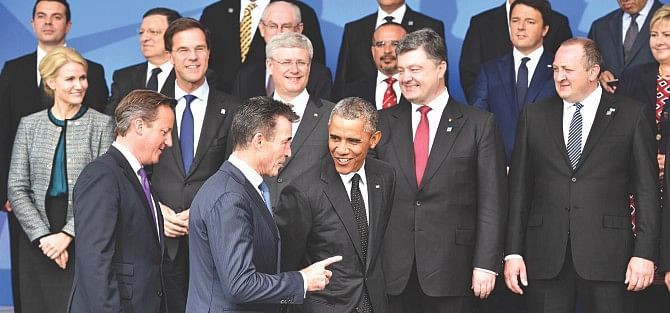Russia, IS threats dominate talks
Russia, IS threats dominate talks
New sanctions on Moscow on the cards despite ceasefire hopes

A Nato summit billed as the most important since the Cold War got underway yesterday with calls to stand up to Russia over Ukraine and confront Islamic State extremists.
The Ukraine crisis tops the agenda but the 28 leaders must also tackle new threats posed by Islamic State in Iraq and Syria, and oversee a problematic withdrawal from Afghanistan.
"To the east, Russia is attacking Ukraine," Nato secretary general Anders Fogh Rasmussen said as he arrived for the two-day meeting held amid heavy security in Newport in Britain.
"To the southeast we see the rise of a terrorist organisation, the so-called Islamic State," Rasmussen said, adding: "We will take important steps to counter these threats."
US President Barack Obama and British Prime Minister David Cameron warned their allies not to shirk the challenge.
Vowing to "confront" Islamist radicals in Iraq and Syria, they said they would not be "cowed" following the beheading of two US journalists.
They were equally trenchant over Ukraine. "Russia has ripped up the rulebook (with)... its illegal annexation of Crimea and its troops on Ukrainian soil threatening and undermining a sovereign nation state," they said in a joint editorial in The Times newspaper.
In response, they said Nato -- set up in 1949 to defend Western Europe against the Soviet Union -- should support Ukraine's right to choose its own future and build a "persistent" presence in Eastern Europe to reassure nervous allies.
In a high-profile gesture of support, Cameron met Ukrainian President Petro Poroshenko with his peers from France, Germany, Italy and the United States.
Russian Foreign Minister Sergei Lavrov lashed out after British Prime Minister David Cameron and US President Barack Obama argued in an article in the Times newspaper that Russia had "ripped up the rulebook" over Ukraine.
Lavrov denied Russian military involvement and accused the United States of undermining peace efforts by supporting "a pro-war party" in Kiev.
He said Washington was "drunk on anti-Russian rhetoric" after repeated accusations from the West that Russia is training and supplying rebels and sending its soldiers into Ukraine.
The summit is expected to create trust funds for Ukraine's military, set up new high-readiness units and position troops and equipment in former Soviet bloc Nato members unnerved by Russia's involvement in the conflict in Ukraine.
In a clear effort to seize the initiative ahead of the summit, Russian President Vladimir Putin unveiled a plan on Wednesday which he said would produce a ceasefire on Friday -- the same day the European Union is expected to announce additional economic sanctions against Moscow.
French President Hollande said the sanctions would be approved on Friday "if there has been no progress".
"Everything will depend on the next few hours," he told reporters at the summit. But a British government source said the sanctions were sure to go ahead.
Nato has accused Russia of sending hundreds of troops and tanks into Ukraine in what Rasmussen has warned is the most serious security threat to Europe since the Cold War.
Nato meanwhile faces another quandary in Afghanistan, where the alliance is due to end its combat operation this year, but finds it has no government to hand over to as presidential elections have failed to produce a winner.